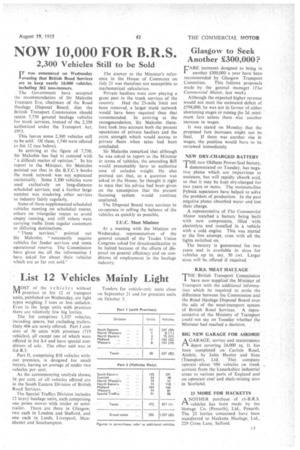NOW 10,000 FOR B.R.S.
Page 64

If you've noticed an error in this article please click here to report it so we can fix it.
2,300 Vehicles Still to be Sold
IT was announced on Wednesday evening that British Road Services are to keep nearly 10,000 vehicles, including 362 non-runners, The Government have accepted the recommendation of Sir Malcolm Trustram Eve, chairman of the Road Haulage Disposal Board, that the British Transport Commission should retain 7,750 general haulage vehicles for trunk services, instead of the 2,350 authorized under the Transport Act, 1953.
This leaves some 2,300 vehicles still to be sold, Of these, 1,540 were offered in list 12 (see below).
In arriving at the figure of 7,750, Sir Malcolm has had to contend with "a difficult matter of opinion." In his report to the Minister, Sir Malcolm pointed out that in the B.T.C.'s books the trunk network was not separated statistically. Some 3,300 vehicles were used exclusively on long-distance scheduled services, and a further large number was rendering other services to industry fairly regularly.
Some of these supplemented scheduled vehicles running on scheduled routes, others on triangular routes to avoid empty running, and still others were carrying traffic from regular customers to differing destinations.
These services," pointed out Sir Malcolm, "necessarily require vehicles for feeder services and some operational reserve. The Commission have given me all the informatioe I have asked for about their vehicles which are so far not sold." The answer to the Minister's reference in the House of Commons on Tilly 21 was therefore not susceptible to mathematical calculation.
Private hauliers were now playing a great part in the trunk services of the country. Had the 25-mile limit not been removed, a larger trunk network would have been required than that recommended. In arriving at the recoriimendation, Sir Malcolm therefore took into account both the present operations of private hauliers and the extra strength which would accrue to private fleets when Sales had been concluded.
Sir Malcolm remarked that although he was asked to report to the Minister in terms of vehicles, the amending Bill would presumably have to authorize tons of unladen weight. He also pointed out that, as a question was asked in the House, he thought it right to state that his advice had been given on the assumption that the present licensing system would continue unaltered.
The Disposal Board were anxious to co-operate in selling the balance of the vehicles as quickly as possible.
T.U.C. Meet Minister At a meeting with the Minister on Wednesday, representatives of the general council of the Trades Union Congress asked for denationalization to be halted because of the, effects of disposal on general efficiency and on conditions of employment in the haulage industry.
Glasgow to Seek Another £300,000?
L'ARE increases designed to bring in another £300,000 a year have been recommended by Glasgow Transport Committee. This follows proposals made by the general manager (The Commercial Motor, last week).
Although the expected higher revenue would not meet the estimated deficit of £594,000, he was not in favour of either shortening stages or raising the 2d. minimum fare unless there was another increase in wages.
It was stated on Monday that the proposed fare increases might not be final If there was another rise in wages, the position would have to be reviewed immediately.
NEW DRY-CHARGED BATTERY THE new Oldham Power-Seal battery, demonstrated on Tuesday, has negative plates which are impervious to moisture, but will rapidly absorb acid, so that it may be kept dry-charged for two years or more. The moisture-free Fybrak separators have helped to solve the problem of production. In the past negative plates absorbed water and lost their charge.
A representative of The Commercial Motor watched a battery being built with new components, filled with electrolyte and installed in a vehicle with a cold engine. This was started at the first attempt, even with all the lights switched on.
The battery is guaranteed for two years and is available in sizes for vehicles up to, say, 30 cwt. Larger sires will be offered if required.








































































































